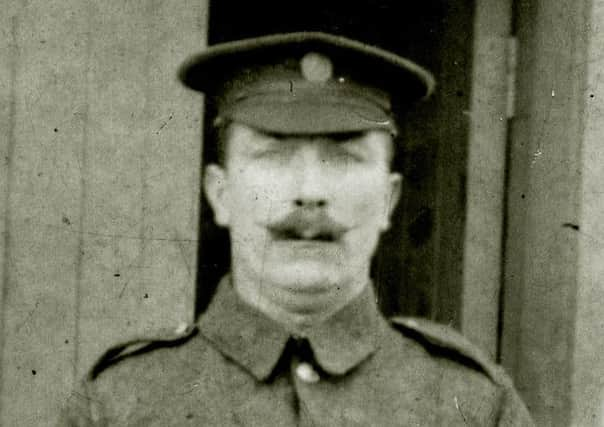Ulsterman's harrowing Great War diary revealed 100 years on


John McGonigal Snr made it back in one piece from the Great War and died of a heart attack at his home on the village’s Main Street on April 20 1953.
The 80-year-old went to his grave without telling anyone of the diary he recorded while in France over a five-month period from mid-October 1915 until March 20 1916.
Advertisement
Hide AdAdvertisement
Hide AdPrivate McGonigal 19156, whose name is on the village’s new war memorial, kept its existence a complete secret, mentioning it to no-one, not even close family members.
In 1961, 44 years after he was medically discharged from the war on August 4 1917 and eight years after his death, his daughter Polly spotted a small advert/letter in a local paper from a D.G. Moore of Penzance in Cornwall.
It read: “I have come across a small war diary of a soldier of the 1914-18 War (in pencil). I think the writer was J. McGonigal, Private 10th Royal Inniskilling – there is a reference to Maghera. If he or any relative would care to have it I shall be happy to oblige.”
Intrigued, Polly immediately applied to D.G. Moore and provided proofs of her identity and she received the pencil-written diary in which her father apologises for the occasional missing word, explaining that he had to sharpen his pencil with his teeth.
Advertisement
Hide AdAdvertisement
Hide AdJohn McGonigal was approaching 40 years of age when he volunteered for the Inniskilling Fusiliers in November 1914, and later the Ulster Division having seen action in the Boer War for which he was awarded the Queen’s South African medal (with clasp) serving under Queen Victoria until 1903.
In one diary entry he writes about going to the trenches at the front line for the first time. “You must always go into them and come out at night. Nothing I could say wood (sic) describe the trenches. No one could live in them for long. No matter whether the Germans let you live or not.
“At the time I speak of and for days before there was deep snow and more continuously falling ... the trenches came in for the largest share. We got to our quarters which in the meantime goes under the name of The White City.”
And of his duty with the burial parties: “The first one I saw in the morning that I knowed from home was Matt Hassan. Neither of us spoke just shaked our head at the other for he came to help the stretcher bearers to get the dead out of the trenches with snow and water a foot deep so they had to pull of slip them along ... the very belts was blown in pieces of some of them. I helped to carry some of their things away. They were nearly all killed about 15 yards of ground we had to climb over them to get out. I was very sorry for the poor chaps, especially as three of them was from my own section more so for a wee fellow called David from Drumlamph below Castledawson. His head was nearly all blowed (sic) off what is more lamentable to think was that their bodies was buried behind the trenches all together and the next day or two the gunners landed a trench mortar on them and they were torn out of their graves – what did they care then.”
Advertisement
Hide AdAdvertisement
Hide AdThe sheer ferocity of the war is captured in an entry entitled ‘Explosion’ when the ground shook. “I spoke saying in the name of God is the ground going to open and swallow us up? On that moment the explosion went up 500 feet and remained for three minutes. The smoke remained about 20 minutes. We saw what was nothing else but the clothes of women and children falling out of the sky. There were 1010 killed and wounded. The town was about the size of Maghera.”
The diary, along with another one relating to 1922, is now in the hands of John’s great grandson Adrian Nelson, who plans to bequeath it to the Innskillings Museum.
“What happened to the diary between 1916 and 1961 is a complete mystery,” said Adrian. “He (John) never told anyone about it, there was no mention of it until that advert appeared in 1961.
“Nobody knows who D.G. Moore is either, or how he came to have the diary. When Polly received the diary she got it from someone in Londonderry, which adds to the mystery.”
Advertisement
Hide AdAdvertisement
Hide AdMr Nelson has managed to get the diary entries transcribed and typed-up as he was curious to read it in its entirety. He admits he has other notebooks belonging to John in his possession which he has yet to look at.
Speaking at his funeral in 1953 Church of Ireland rector Rev R.H. Faulkner summed up Private McGonigal as “a man of great intelligence, well read, of wide experiences in the affairs of man and a seeker of the truth.”